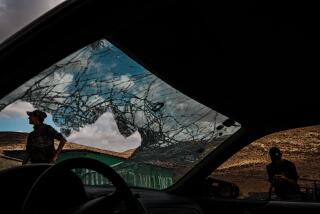An intruder in the cult of whoopy doop
The selection of a campsite is always critical, but never more so than when there are 65 men at a gathering and you are the only woman. And itâs against the rules for you to be there.
The 98th Jaeger Palaver convened this autumn on a remote sweep of the Mojave Desert southeast of Barstow. When I arrived campers were tossing down sleeping bags along the rim of an arroyo, an open stage with few places for an interloper to hide. Avoiding curious glances, I drove on and tried to look as if I might just be passing through. The dirt track grew fainter. Creosote smoked under my Subaru.
Climbing a rise, I disappeared from the groupâs view and set up camp near an abandoned fire ring. To postpone the uncomfortable moment of confrontation, I fussed around, reading and rereading the directions on my backpack stove.
If I were here simply to annoy the guys I would have plopped down anywhere. But this was not a whimsical intrusion. Ever since I moved to Palm Springs eight years ago, the late Edmund C. Jaeger has been one of my heroes. He is to our local deserts what John Muir was to the California mountains -- naturalist, philosopher, popularizer. In his 14 books, including the classics âDesert Wild Flowersâ and âThe California Deserts,â Jaeger wrote about tumblebugs and shovel-nosed snakes in a âWild Animals I Have Knownâ style that makes readers want to get out and shoo scorpions out of their Merrells.
âHis contribution to the deserts is irreplaceable,â says James Bryant, curator of natural history at the Riverside Municipal Museum. âHe turned the desert into a respectable subject of study.â
The Palavers got started in 1954 when Jaeger put out a call inviting his former students from Riverside Community College to gather in the Mojave Desert. The tradition continued even after Jaegerâs death in 1983, at age 96. For almost 50 years now, anywhere from 60 to 150 men have converged each spring and fall in out-of-the-way camps to palaver (by Jaegerâs definition it means âto gab profuselyâ) about bugs, rocks, stars and flowers.
The palaverites are cultish in their allegiance to Jaegerâs way of doing things. Many shun tents and sleep outdoors or in the back of pickups because Jaeger did it that way. And because Jaeger said so, they forbid smoking, alcohol, drugs, firearms, dune buggies, transistor radios and women. âDr. Jaeger thought if we had the girls along weâd pay more attention to the girls than to the desert,â explained Jack Harris, a retired farmer from Riverside who presides at the Palavers these days.
Before heading into the desert, I talked to a few Jaeger devotees. I was encouraged to learn that at least one woman had camped two or three miles away from the group and slipped in for evening campfires disguised as one of Jaegerâs âlads.â
I, too, wanted to go on Palaver, but I had no desire to sketch sideburns on my cheekbones or skulk around by night. So I asked Richard Jones, a Riverside music teacher and veteran palaverite, if I could attend. The desert, he reminded me, is free country. That was all the clearance I needed.
Donât shun me
The afternoon was golden, warm and still, except for the rude grunt of an electric pump inflating someoneâs air mattress. Slinking down the hill toward headquarters, I met a man and his two small sons. I assured them I shared their devotion to Jaeger and I hoped they wouldnât mind that I was there: Please, please donât shun me. The little boys glanced up, then went back to digging in the sand.
My self-conscious promenade was going OK until I stumbled onto the campsite of Scott Hooper, an engineer and musician from San Jose. Hooper heckled me for wearing too-new khakis (Palaver wardrobes tend toward the antique), and made a loud joke about the rudimentary outhouse: an open trench latrine in the middle of camp, barely concealed with a burlap drape that made the facilities look like a survivalistâs bunker.
I left Hooper slopping sunscreen over his face, and marched on toward the heart of the encampment: Jack Harrisâ 1955 military green International Harvester.
Sitting around Harris in folding chairs were the hard-core, the older men who had known the âDean of the Desertsâ himself. It got too quiet when I strolled up. I took a seat on the sidelines and listened. The men made frequent references to âDr. Jaegerâ (never âEdâ) and his scientific discoveries, including the astounding find that birds hibernate. No detail of Jaegerâs life was too small to hash over. Would Dr. Jaeger say ne-ah-TOE-mah or ne-AH-toe-mah? (A neotoma is a pack rat.)
Awkwardly, I sat listening to this game of Jaeger Trivial Pursuit. In a book called âSon of the Living Desert,â Iâd read that Jaeger had names for all the utensils in his camp. His wash basin was âCorvusâ for the ravens who flocked near where he found the castoff pot. The whittled handle for his skillet was, for unknown reasons, âWhoopy Doop.â
I waited for an opening to drop into the conversation, then sprinkled my chatter with terms such as âWhoopy Doopâ and âAvawatzicaâ -- a camp dish invented by Jaeger and named after a species of desert snail.
Going gymmo
Soon the men had shifted their chairs toward me and we were reviewing Jaegerâs other eccentricities like old chums. Though strict in his Seventh-Day Adventism, the professor liked to wander around naked on the dunes, a practice he called âgoing gymmo.â He detested beards, never married, never owned a TV and was suspicious of radios and telephones.
I felt more confident about joining the fraternity the next afternoon, when palaverites were summoned by the traditional ringing of a cowbell Jaeger found in Baja some 70 years ago.
We all assembled at the Harvester to witness the rituals that hold the Palavers together. Harris normally confers Palaver patches on those who have attended 10 gatherings, but no one qualified this year. So he moved on to a raffle of keepsakes found in Jaegerâs garage after he passed away. Sometimes itâs a dusty coffee maker or pressure cooker. This year, Gary Denton won Jaegerâs battered stamp box.
In years past the ritual has included pet shows (once someone brought an ocelot), rocket-launching demos and displays of freeze-dried reptiles. But behind the lightweight rites is a serious purpose: The Palaver gets people out exploring the off-the-highway places Edmund Jaeger frequented.
Iâve lived in Southern California much of my life, but the Palaver site was a place I would conceivably never have come to on my own. And palaverites learn to really see, as Jaeger did. All weekend people were bent over examining the ground intently and gesturing. Now and then someone would return to Harvester Central to share what heâd found: a leopard lizard, a plate-sized tarantula, a coachwhip skin, agate flakes, horned lizards, a meteorite, a clay figurine with mica eyes.
As I returned to my tent under a smoggy full moon I passed a sunburned Hooper who appraised my now-dusty khakis, pockets weighted down with pebbles. He said, grudgingly, I could be âan honorary guy.â
Late into the night, Hooper and his friends rested on their half-inflated air mattresses, palavering about Archimedes and Johannes Kepler. Jaeger would have been proud. The lads were using their all-guy getaway to talk -- not about girls -- but about the laws of planetary movement.
More to Read
Sign up for The Wild
Weâll help you find the best places to hike, bike and run, as well as the perfect silent spots for meditation and yoga.
You may occasionally receive promotional content from the Los Angeles Times.






